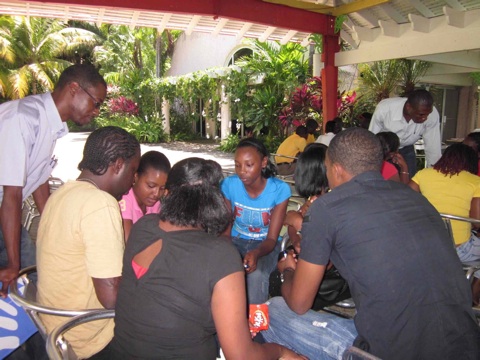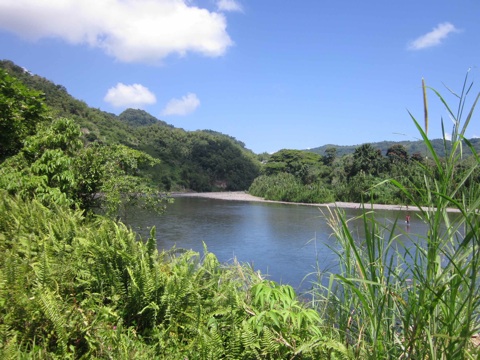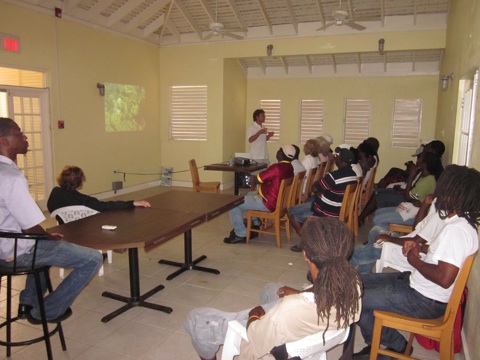The crew of the M/Y Golden Shadow is busy getting the ship ready to depart for the Global Reef Expedition’s next mission to Navassa Island, an uninhabited island between Jamaica and Haiti currently managed by the US Fish and Wildlife Service.
During the extended surface interval in Port Antonio, Jamaica, staff cataloged samples, reorganized the lab, and indexed the data for processing by various partners. The hiss from the dive locker means Dive Safety Officer Nick Cautin was busy filling tanks for tomorrow’s dives. The activity on-board never stops.
Community-based Coral Reef Workshops for Navassa High School Students
In addition to scientific research, education and outreach are important components of the Global Reef Expedition. The Living Oceans Foundation staff conducted two community-based coral reef workshops while in port. In the first workshop, the Foundation hosted 5 high school students from Port Antonio High School and 25 college students from the nearby College of Agriculture, Science, and Education (CASE). Eddie Gonzalez, LOF Director of Education, presented on the work of the Foundation and the importance of investigating the natural world. The students also observed a research vessel up close as they toured the Golden Shadow.

The Living Oceans Foundation operates under the theme Science Without Borders®, sharing knowledge and resources to make substantial progress in conserving the world’s reefs–a job that transcends all borders! Working under the same theme, the students split up into teams to identify priority areas for habitat or species conservation work based on their knowledge of the island. Each team then shared their assessments with the rest of the group. The compilation will hopefully lay the groundwork for future student-led conservation projects in Jamaica. While figures vary, most ecologists agree that only a small portion of all terrestrial and marine species have been documented. I suspect we will see a discovery or two from these students in the coming years.
The Foundation conducted the student coral reef workshop in partnership with the Portland Environment Protection Association (PEPA) and the local office of the Nature Conservancy. PEPA’s mission is to promote public awareness and action, protect the environment, and ensure the wise use of natural resources for sustainable development. The Nature Conservancy focuses its work on local fisheries, forest preservation and protection, and the conservation of the Rio Grande, the largest source of surface water on Jamaica. Both groups are extremely active in the community.

At a workshop organized by the Blue Lagoon Restoration Project (a locally driven conservation effort to protect Portland’s Blue Lagoon area), Dr. Andrew Bruckner, LOF Chief Scientist, reported on the Foundation’s recent mission to Pedro Bank, an important fishery in Jamaica, to a group of local fishers concerned about declining fish stocks.
He discussed the noticeably smaller sizes of groupers and parrotfish seen in Pedro Bank and the continued use of destructive practices such as surface supplied air “hookahs” by spear-fishers looking to extend their bottom time and wide area nets that catch large volumes of fish, even if undersized. Fortunately, the use of fish pots that indiscriminately catch fish has declined, but more work remains.

This group clearly has its eyes on the future and will be an important partner to future conservation efforts. One participant at the coral reef workshop remarked, “I don’t understand why we can’t establish a culture among us that guides us to leave certain fish alone and throw back fish that are too small.”
(Photos/Images by Eddie Gonzalez)
To follow along and see more photos, please visit us on Facebook! You can also follow the expedition on our Global Reef Expedition page, where there is more information about our research and our team members.
